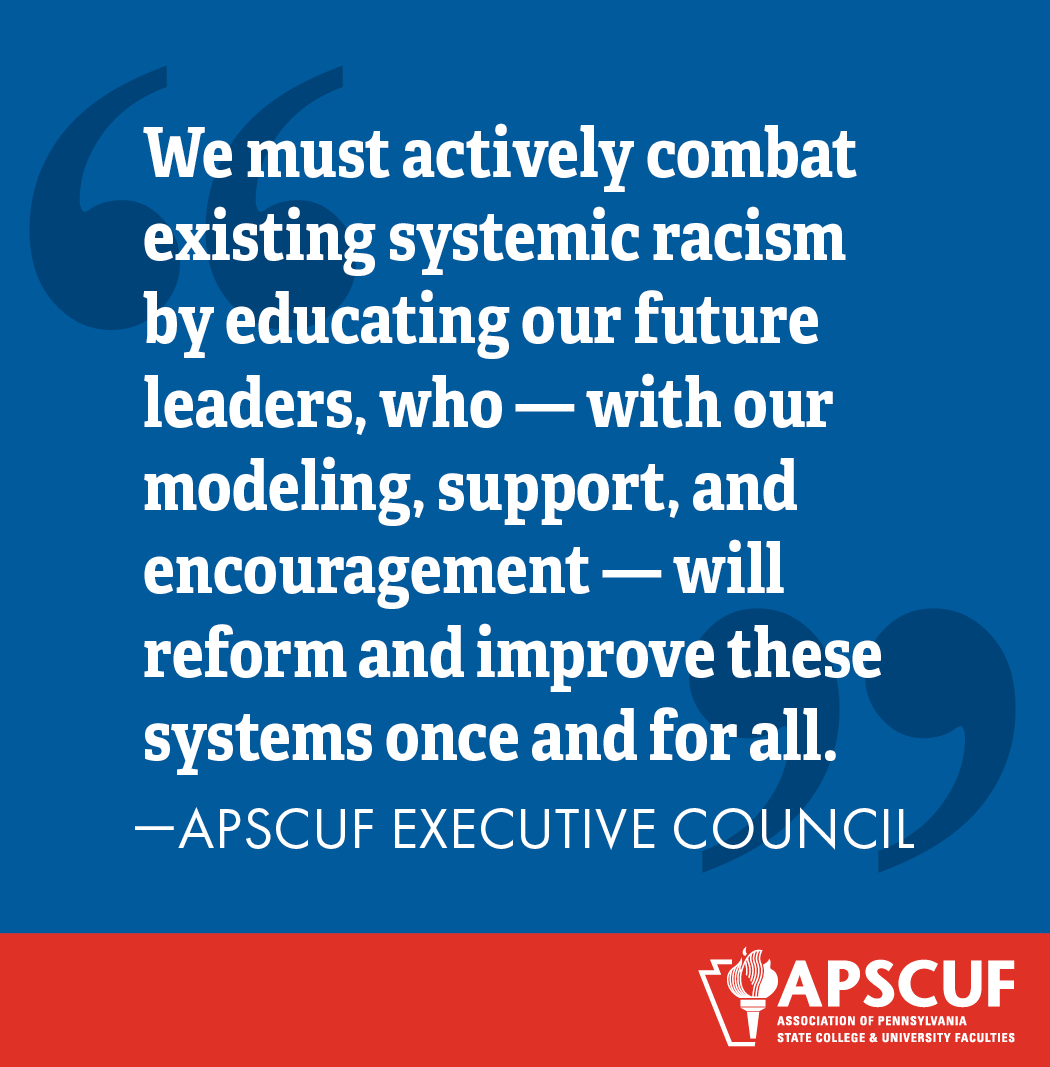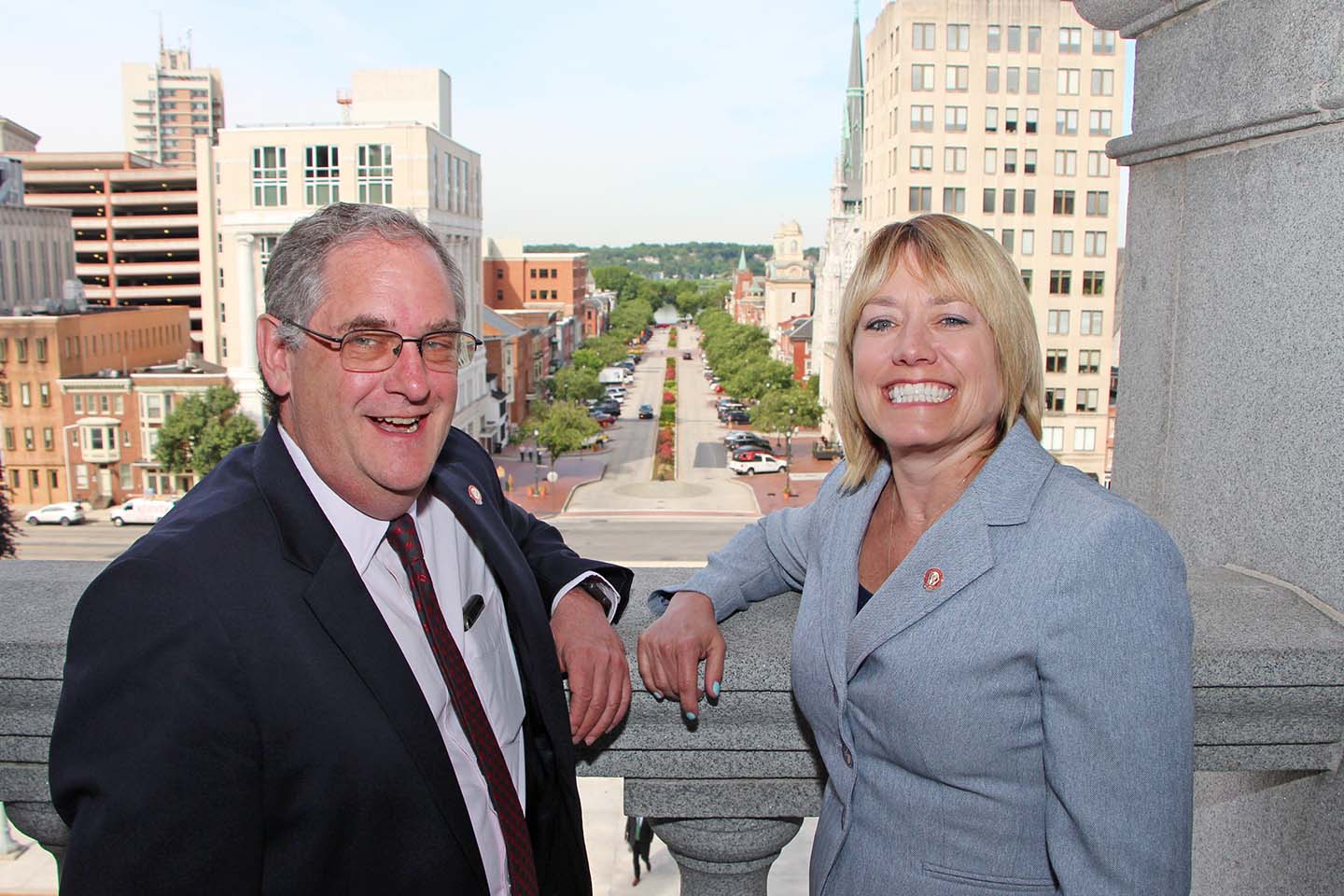Blog
See Dr. Jamie Martin’s remarks to the Board of Governors – July 16, 2020
The July 16 Board of Governors meeting took place via Zoom. Click the video above to listen to APSCUF President Dr. Jamie Martin’s comments, or read them below as prepared:
Chairwoman Shapira, Chancellor Greenstein, governors, university presidents and guests,
Good morning. My name is Jamie Martin. I am the president of the Association of Pennsylvania State College and University Faculties (APSCUF), which represents the faculty and coaches at our 14 great universities.
March 16, 2020, is a date that I clearly recall, as it was the last one that I spent in my campus office at IUP. On that date, there were 76 cases of COVID-19 in the Commonwealth of Pennsylvania. The first death in the state occurred two days later, on March 18. Around that same time, Chancellor Greenstein made the decision to stop all face-to-face classes for at least two weeks, to coincide with Gov. Wolf’s order to close K-12 schools for the same period. The chancellor stated, and rightly so, that he made the decision in the interest of the health and safety of all Pennsylvanians. As we know, we did not return to face-to-face classes.
Now, four months later, on July 16, we have close to 100,000 cases of COVID-19 in Pennsylvania, and we are nearing 7,000 deaths from this virus. If, in March, we decided to keep our students safe at home to reduce the likelihood of them congregating on- and off-campus and risk contracting this deadly virus when there were 76 cases of COVID, why are most universities still planning on bringing students back to campus and delivering classes in a face-to-face format when there are nearly 100,000 cases here in our state? How is that in the interest of the health and safety of all?
We also now know what age group seems to be at the root of the increase in cases in Pennsylvania. On July 4, 2020, and again on July 9, 2020, the Pennsylvania Department of Health issued two alerts regarding an increase in COVID-19 cases in the state and about the “changing epidemiology of COVID-19 case demographics.” Dr. Rachel Levine noted the increasing numbers of cases among younger people, with transmission associated with “travel and social gatherings or social settings, including bars, restaurants, and parties.” Across the Commonwealth, cases are growing in the 19–24 age group. According to data collected by the State System of Higher Education, in fall 2019 over 90% of the students at our 14 universities were traditional age: the 18–24-year age range.
In short, cases of COVID-19 in individuals of college age are rising, and we do not know when the top of the “spike” will come. The surge in cases is primarily the result of social gatherings, parties and meeting up at bars. Still, those most at risk of more severe outcomes from COVID-19 are older adults, and the risk increases with age. This is one of the many reasons why faculty members have so many concerns about returning to face-to-face teaching in the fall.
APSCUF recently distributed a survey to about 4,800 of our members, and nearly 3,200 responded to it — a 66% response rate. We were interested in their views, concerns and issues regarding the fall 2020 reopening plans. I was not surprised by the number of responses that we received, but the results are sobering.
Over 40% of the faculty who responded have an underlying medical condition, as outlined by the CDC, that puts them at increased risk for severe illness from COVID-19. Among those faculty, over half also live with or care for another who is at risk. Over 60% of our faculty are concerned about contracting COVID or potentially exposing their family to it. The faculty also have grave concerns about the COVID testing capability of their university and/or local community healthcare systems, as well as concerns about adequate contact tracing. In the survey, we asked if faculty felt they could safely teach face-to-face in the fall, and 71% said no. Another concern, expressed by over 90% of our faculty, is the belief that students will not appropriately social distance outside of the classroom — in their residence halls or off-campus housing, or when they congregate in social settings or at bars/restaurants. In short, we believe that our students will behave in the same way that other 19–24-year-olds are doing in our communities where they are driving the spike in COVID-19 cases. Please understand: I am not being critical of our students. I recall my college days, and while the curricular element was important, so, too, were the extracurricular activities, and these often involved congregating in groups with my friends.
To be sure, our members are anxious to be back in the classroom in the fall, but they are rightly fearful of teaching face-to-face classes: Only 12% of the survey respondents indicated a preference for in-person teaching this fall. So, what are we asking for? We are asking that our faculty be permitted to feel safe, that their concerns about their health and the health of their loved ones be taken seriously. My colleagues want to teach — they just do not want to become sick. The chancellor has repeatedly expressed appreciation for the faculty; we are asking that he demonstrate that appreciation by encouraging our universities to allow for flexible work options for our members who have underlying medical issues that put them at risk, or live with or care for someone who is at risk.
We would also like to know, in advance of the start of the fall semester: How many cases will have to occur on any of our campuses before action is taken? How many sick students, staff and faculty will it take to consider an alternative to face-to-face delivery of courses? My colleagues have asked me to ask all of you this question.
I recognize that our university presidents and their leadership teams have worked hard to assemble reopening plans. I know that Chancellor Greenstein has provided guidance and a framework for those plans. I do not envy the difficulty you have all faced in pondering the start of the fall semester. I know several of you very well, and I know that these decisions are causing angst.
However, we have heard often about the need to make data-driven decisions, and yet moving forward with fall 2020 reopening plans that include a significant number of face-to-face classes seems to fly in the face of the data. Just yesterday, Dr. Robert Redfield, the director of the Centers for Disease Control and Prevention, said this:
“I am worried. I do think the fall and the winter of 2020 and 2021 are probably going to be one of the most difficult times that we have experienced in American public health … because of the co-occurrence of COVID and influenza”
We appreciate the decisions made by President Fiorentino and President Welsh and their respective leadership teams for looking at the data, examining the science and listening to the predictions being made by our public health officials about the upcoming fall and winter months. I can tell you both that after you announced your decisions to move to primarily remote learning, my friends and colleagues on your campuses breathed a sigh of relief. It was and is, palpable. To the presidents at the other 12 universities, I will ask once again that you be cognizant of what you are asking your faculty to do, and to bear in mind their concerns about the safety of our students, their own safety and the safety of their loved ones.
Before I close, I wish to express my appreciation for your recognition of Dr. Kenneth Mash today. There is no one who is more deserving of sincere thanks and gratitude. Dr. Mash fought tirelessly for our members, and I know that if he were still our president that he would be arguing for the same things that I have been. Dr. Mash will be returning to teach classes this fall at East Stroudsburg University, and I must tell you that I am relieved that he will not be teaching face-to-face. If he were, I would have been truly concerned for my friend and his health. If you truly wish to honor his dedication and his lengthy service to APSCUF, to the State System and to our students, please do so by not putting our colleagues in harm’s way.
Thank you for your time today, and I continue to wish all of you and your loved ones good health.
Some results from our reopening survey
 About three-quarters of surveyed APSCUF faculty members do not believe they can safely teach face-to-face in the fall semester, according to our survey conducted last week. Click here to read today’s release.
About three-quarters of surveyed APSCUF faculty members do not believe they can safely teach face-to-face in the fall semester, according to our survey conducted last week. Click here to read today’s release.
Thank you to the thousands of faculty who completed the survey. APSCUF based its questions on Purdue University Senate’s reopening survey.
A roundup of faculty and coach accomplishments: 2019–20
The faculty and coaches of Pennsylvania 14 state-owned universities do incredible work every day. Here are just a few of the achievements that our members have accomplished this past year in their communities and their fields.
Bloomsburg University men’s and women’s swimming Head Coach Stu Marvin was named to the Pennsylvania Aquatics Hall of Fame.
California University professor Sean Madden helped deliver food across Pittsburgh amidst the pandemic.
Cheyney University turned to former basketball great Leon Bell to take over as head coach and “revive” the program.
Faculty members Marc Sanko and Jeffrey Diamond of Clarion University started a history podcast about the Pennsylvania Wilds region.
East Stroudsburg University Professor Bonnie Green explored how to prevent critical remarks of students from discouraging their pursuit of education.
Professor Victoria Hedderick was named Edinboro University’s 2020 Faculty Member of the Year.
Indiana University of Pennsylvania Associate Professor Kenneth Coles won the 2020 Prose award in cosmology and astronomy for his book, “The Atlas of Mars: Mapping its Geography.”
Ann Lemon and Megan O’Byrne won Kutztown University’s Faculty Excellence Awards for their work in communications. Lemon coordinates large-scale New York City design, and O’Byrne does work in general education and assessment.
Professor Robert Myers, director of environmental studies at Lock Haven University, published “Reconciling Nature: Literacy Representation of the Natural, 1876-1945.”
Kristen Long, assistant professor of biology at Mansfield University, presented research on pancreatic cancer with one of her students at the 2019 American Association of Cancer Research’s Pancreatic Cancer: Advances in Science and Clinical Care conference.
Millersville University Professor Mark Snyder received the Paul T. Hiser Exemplary Publication Award for his article published in The Journal of Technology Studies titled “A Century of Perspectives that influenced the Consideration of Technology as a Critical Component of STEM Education in the United States.”
Alison Dagnes, professor of political science at Shippensburg University, gave a TED Talk at a Harrisburg TEDx event on outrage-based political media.
Slippery Rock University cross-country head coach John Papa was awarded his 21st Pennsylvania State Athletic Conference Coach of the Year award.
Don McCown, associate professor of health at West Chester University, began offering free daily online meditation and dialogue sessions.
We are thankful to all of the faculty members across our 14 campuses for the work that they do. If you have any accomplishments, accolades, or achievements that you would like to see shared with our followers, we’d love to hear them. Share them with us on social media, or email us at .
—Kyle Bower,
APSCUF intern
Black Lives Matter: Educators have opportunity, obligation
APSCUF today addressed the opportunities and obligations educators have to confront issues of systemic racism. Click here to read the full statement released through APSCUF’s executive council.

APSCUF president faces challenges old and new, stands with her team ready to take them on
Dr. Jamie Martin began her presidential term June 1, as the Association of Pennsylvania State College and University Faculties faces a public health crisis and looming uncertainties about the state of higher education in the Commonwealth. In her eventful first week, she said she wishes her transition were “a bit more boring.”

Dr. Kenneth M. Mash, left, and Dr. Jamie Martin, visit the Pennsylvania Capitol in summer 2019, when they were APSCUF president and vice president, respectively. Martin’s presidential term began June 1. APSCUF file photo
An APSCUF member since her first day as a faculty member at Indiana University of Pennsylvania, Martin has since served in numerous roles in the organization — from grievance chair at IUP to state vice president with immediate-past President Dr. Kenneth M. Mash. In April, delegates voted in Martin as APSCUF’s second elected woman president. Martin said after her election that she has “big shoes to fill” in replacing Mash, but the former president expressed confidence in the future of APSCUF and the new leadership, offering a bit of advice.
“The thing that gives me most faith in the future of our union is the strong tradition of involvement and the great people,” Mash said. “Dr. Martin is a great APSCUF leader. She is talented, wise, and as tough as nails. My advice to her would be to have confidence in her abilities.”
In her years at APSCUF, Martin has fought for fair contracts as part of negotiations teams and for lower costs for students. As a professor, she has heard the testimonies of students who struggle with finances, work multiple jobs, and still are unable to afford necessities such as food and school books.
“One thing I want students to know about APSCUF is that faculty care deeply about them and the education that they are receiving, and when we talk to legislators, we fight for them,” she said.
The biggest issue facing Pennsylvania public higher education in recent years is inadequate funding. Martin stressed the importance of unity during this and other challenges.
“Our nation is dealing with this pandemic and it has impacted all facets of our society, including higher education,” she said. “This of course leads to a lot of uncertainty and questions about the upcoming fall semester.”
Martin said she is motivated by the students, faculty, and colleagues.
“My favorite part of the job is the people,” she said. “It has been such a pleasure to meet colleagues and students at the 14 universities.”
–
More about Martin
Dr. Jamie Martin graduated from IUP with bachelor’s and master’s degrees and a doctorate in criminology. Her research has focused on qualitative research, corrections, and criminal-justice ethics. She has published articles in the Journal of Criminal Justice Education and American Journal of Criminal Justice, and she has also published a book called “Looking Out: Jailed Fathers’ Perceptions about Separation from Their Children.” Additionally, she won the Center for Teaching Excellence Award in 2004 and the Outstanding Teacher Award in the College of Health and Human Services in 2008.
Outside her career work, she enjoys Civil War history and reading other academic literature. She also loves being outdoors and enjoying a glass of wine. Martin is married to her husband, Randy, with two sons, two grandchildren, a Boxer named Max, and two parrots.
—Kyle Bower,
APSCUF intern